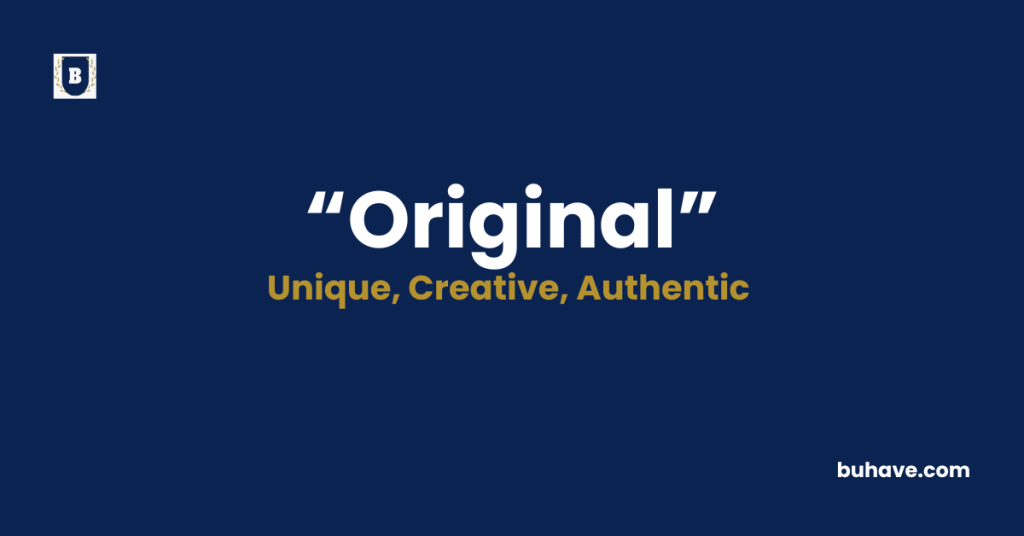The word ‘Original’ (Adjective) describes something that is the first of its kind or something that is unique and not derived from anything else. In this guide, you’ll learn the full definition, synonyms, antonyms, etymology, and real-life examples of how to use ‘Original’ correctly in sentences.
Original Explained in Depth
A complete and detailed guide to the word Original including meaning, definition, examples, etymology, synonyms, and antonyms.
Meanings of Original
The word original refers to something that is novel, unique, or the first of its kind. It is used to describe ideas, works of art, products, or thoughts that are not copied, imitated, or derived from something else. When we say something is “original,” we’re emphasizing its authenticity and creative independence.
In broader usage, the term can also refer to a person who is inventive or creative in their thinking. Someone who comes up with fresh, unconventional ideas can be said to have an original mind. The word also plays a vital role in distinguishing between the source and subsequent versions, like original documents versus photocopies, or original versions of songs versus remixes or covers. In everyday language, calling something original is a form of praise—it implies authenticity, creativity, and distinction.
Definition
Original is defined as existing from the beginning; first or earliest; not a copy or imitation. It also refers to something created directly and personally by a particular individual or source. When applied to people, it can mean someone who displays fresh and creative thinking or actions.
This term often highlights value and innovation. For instance, in the context of literature or invention, an original work holds greater prestige than one that simply reproduces someone else’s ideas.
Moreover, in legal and technical settings, the term “original” may refer to the first authentic version of a document, which holds primary legal authority.
Etymology
The etymology of the word “original” is rooted in Latin and evolved through Old French before entering English. Here’s a breakdown of its history:
- Latin root: “originem” (nominative: “origo”) meaning “beginning, source, birth.” This is related to the Latin verb “oriri,” which means “to rise, to begin, to be born.”
- Old French: “original,” taken directly from the Latin term and used to refer to something from the beginning or that which is authentic.
By the 14th century, “original” entered Middle English from Old French, keeping much of its original Latin sense intact. It was first used to mean “pertaining to an origin or beginning,” and later grew to include the sense of something “not copied” or innovative.
Thus, “original” came to represent authenticity, individuality, and creativity. The historical development of the term highlights its ties to the ideas of innovation and authority, especially in intellectual, artistic, and legal contexts.
Example Sentences
- The museum proudly displayed an original manuscript written by the author herself.
- His original approach to solving the problem impressed the entire team.
- That song is an original; she wrote both the lyrics and music.
- The artist’s original work sells for thousands of dollars.
- It’s always refreshing to hear an original perspective in discussions.
Original Synonyms
- Authentic
- Unique
- Innovative
- Creative
- Inventive
- Genuine
- Novel
- Unconventional
- Prototype
- Fresh
Original Antonyms
- Imitation
- Copy
- Fake
- Replica
- Unoriginal
- Derivative
- Reproduction
- Secondhand
- Counterfeit
- Conventional
FAQs about Original
Here are some frequently asked questions (FAQs) about the word “Original”
1. What does “original” mean in simple terms?
It means something that is the first of its kind, not copied from anything else.
2. Can a person be described as “original”?
Yes, if someone has creative or unique ideas or behavior, they can be called original.
3. What is the opposite of “original”?
Words like imitation, copy, or replica are considered opposites of “original.”
4. Is “original” always a compliment?
Most of the time, yes. Calling something original usually implies it’s creative or valuable.
5. Can an idea be original?
Absolutely. Original ideas are those that are new, creative, and not borrowed from others.
6. Is “original” the same as “unique”?
They are similar but not identical. “Original” emphasizes being first or innovative, while “unique” means one-of-a-kind.
Explore more O words
Positive words that start with O
Negative words that start with O
Names that start with O
Nouns that start with O
Verbs that start with O

















